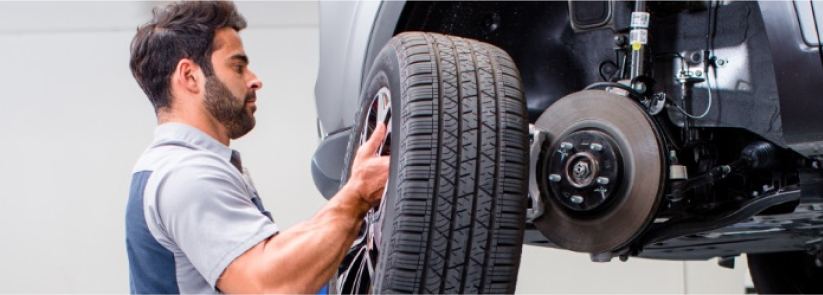Tire Service: The Impact of Weather Problems
When it comes to guaranteeing ideal efficiency and safety on the road, recognizing the effect of climate problems on tire solution is important. GMC Tire Service. In this conversation, we will certainly explore the elaborate partnership between weather condition problems and tire solution, dropping light on the relevance of weather-specific tire upkeep techniques and factors to consider.
Warmth and Tire Efficiency
When revealed to high temperature levels, tires experience modifications in performance that can considerably affect lorry safety and security and handling. The warmth generated from prolonged driving or hot climate problems causes the tire rubber to soften, resulting in lowered tread life and raised wear. As the rubber becomes softer, the tire's grip when driving diminishes, influencing braking distances and overall traction. In severe instances, extreme warm can also cause tire blowouts, posturing an extreme security risk to the vehicle and its occupants.

Winter Impacts
Winter conditions can have a considerable effect on tire performance and safety and security. As temperature levels drop, tire rubber can harden, causing reduced grip on icy or snow-covered roadways. In winter, tires may additionally lose atmospheric pressure extra quickly, which can affect managing and gas efficiency. Furthermore, chilly temperatures can create tire sidewalls to tense, enhancing the risk of damage from pockets or other roadway risks.
To minimize the impacts of winter on tires, it is critical to on a regular basis inspect tire stress and inflate them to the maker's advised degrees. Making use of winter season or all-season tires designed for cold climate conditions can additionally boost traction and grasp on icy or snowy roads. Proper tire upkeep, including routine evaluations for wear and damage, becomes a lot more important during cooler months to make sure optimum performance and safety and security.
Rainy Issues Influence
Throughout stormy problems, tire performance and safety and security can be significantly influenced by the damp road surface areas and decreased presence. The walk pattern of tires plays an important role in maintaining traction on damp roads. Tires with damaged footsteps are much more vulnerable to hydroplaning, where a layer of water develops between the tire and the roadway surface area, leading to loss of traction. To battle this, motorists need to on a regular basis evaluate their tires for sufficient walk deepness and think about spending in content tires especially developed for wet conditions.
Moreover, wet weather condition can additionally lower exposure, making it challenging for vehicle drivers to see the road in advance plainly (GMC Tire Service). In such problems, it is essential to change driving speeds accordingly and keep a safe adhering to range to permit abrupt stops. Effectively filled with air tires can also help in keeping control on wet roadways by giving much better handling and grasp
Snow and Tire Safety
When driving in snowy problems, having the ideal tires can make a substantial difference in safety and performance. Wintertime tires are made with special rubber substances and step patterns to supply far better traction on snow and ice compared to all-season tires.

It is essential to comply with supplier guidelines when utilizing and mounting tire chains to prevent damages to the tires and vehicle. By choosing the right tires, preserving proper inflation, and thinking about additional traction help like tire chains, drivers can enhance their safety when browsing snow-covered roadways.
Weather-Related Tire Upkeep
Weather-related tire maintenance encompasses a variety of methods aimed at making sure optimal tire function and long life in different climate scenarios. One key element of weather-related tire maintenance is tire stress regulation. Inspecting tire step frequently and replacing tires when walk wear reaches a certain deepness is crucial for maintaining grip and security in damaging weather.
Conclusion
In conclusion, weather condition conditions have a substantial impact on tire efficiency and safety. From heat influencing tire stress and wear to cold weather decreasing traction, it is vital to take into consideration the weather condition when keeping and using tires.
In this discussion, we will certainly explore the elaborate partnership in between weather condition conditions and tire solution, dropping light on the value of weather-specific tire maintenance practices and considerations.
